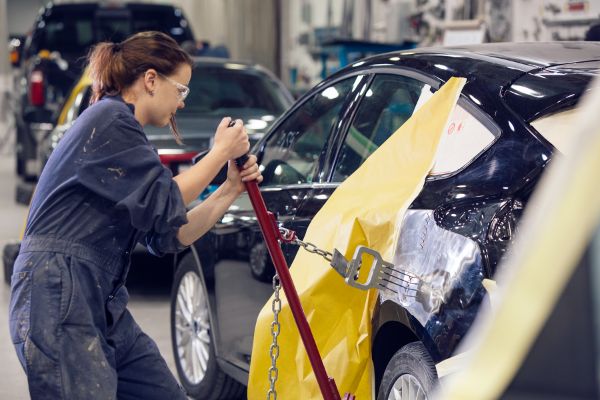For RV enthusiasts, nothing spoils a trip faster than an unexpected breakdown. Whether you’re exploring a national park or relaxing at a campsite, RV maintenance is the key to keeping your journey smooth and stress-free. Preventive care not only saves money but also extends the lifespan of your RV. In this blog, we’ll share essential RV maintenance tips to help you avoid costly repairs and keep your home-on-wheels in top condition.
1. Schedule Regular Inspections at a Trusted RV Repair Shop
Just like your car, your RV needs routine inspections. A professional RV repair shop can help identify issues before they become major problems. From checking your engine and brakes to inspecting the roof, seals, and suspension system, these inspections are vital to avoid breakdowns on the road.
It’s recommended to schedule a comprehensive check-up at least once a year or before any long trip. Look for an RV repair shop with certified technicians, good reviews, and experience with your specific RV make and model.
2. Don’t Skip Roof Maintenance
Your RV roof is constantly exposed to the elements, making it prone to leaks, cracks, and weather damage. A leaking roof can lead to extensive water damage inside your RV, ruining insulation, flooring, and electrical components.
Clean the roof regularly and inspect it for any signs of wear or sealant deterioration. Applying a high-quality sealant or protective coating can add an extra layer of defense. If you’re unsure how to do it, a professional RV mobile repair service can inspect and reseal your roof on-site, saving you the hassle of driving to a shop.
3. Maintain and Test the Electrical System
Electrical issues can sneak up when you least expect them. Problems like blown fuses, dead batteries, or faulty wiring can leave you without power or even cause a fire hazard.
Make sure your batteries are charged and corrosion-free. Test outlets, lights, and appliances regularly to catch issues early. If you notice flickering lights or burning smells, seek help from an RV repair shop immediately.
For convenience, many RV owners use RV mobile repair technicians who come directly to the campsite or storage location to troubleshoot and repair electrical systems.
4. Don’t Ignore Your RV AC System
When you’re traveling during warmer months, a properly functioning air conditioner is a must. Regular RV AC repair and maintenance can prevent uncomfortable trips and costly breakdowns.
Clean or replace filters monthly, and check the coils and fan for dirt buildup. If your AC is blowing warm air or making strange noises, it could signal a refrigerant leak or mechanical issue. Professional rv ac repair services can help restore your cooling system quickly and efficiently.
Pro tip: Run your AC system for 15-30 minutes before your trip to make sure it’s working properly, rather than discovering a problem in the middle of a hot day.
5. Check Tires Before Every Trip
Tires are one of the most critical (and often overlooked) components of RV safety. A blowout on the highway can be dangerous and expensive.
Before every trip, inspect your tires for cracks, bulges, or worn treads. Ensure that tire pressure matches the manufacturer’s recommendations. Don’t forget to check the spare tire as well.
If your tires are more than six years old, consider replacing them—even if they appear in good shape. An RV mobile repair service can often perform tire inspections and replacements right at your location.
6. Keep Plumbing and Tanks Clean
The last thing any RVer wants is a smelly or clogged plumbing system. Clean and maintain your freshwater, gray water, and black water tanks regularly. Use appropriate chemicals and flush systems thoroughly.
Inspect water lines for leaks and replace worn hoses. Winterize the plumbing system if you’re storing your RV in freezing temperatures to prevent pipes from bursting.
If you’re unsure how to handle your RV’s plumbing system, a skilled RV mobile repair technician can walk you through the process or perform the service for you.
7. Monitor the Braking System
Brakes are essential for safety, especially when you’re towing a heavy RV or traveling downhill. Listen for squealing or grinding sounds and feel for delayed braking response.
Brake pads, rotors, and brake fluid should be inspected and maintained regularly. A qualified RV repair shop can perform a full brake system inspection and ensure that your vehicle stops reliably every time.
8. Use an RV Maintenance Checklist
Staying organized is key to proper RV maintenance. Create a checklist that includes:
- Tire pressure and condition
- Brake system inspection
- Roof seal inspection
- AC filter cleaning
- Battery level check
- Plumbing system flushing
- Lights and signals test
- Oil and fluid levels
Use this checklist before every trip and seasonally during long-term use or storage.
Conclusion: Prevention Saves Money
Breakdowns aren’t just inconvenient—they’re expensive. Fortunately, you can avoid many common RV issues by following a regular maintenance routine. Whether you prefer using a full-service RV repair shop or rely on the convenience of RV mobile repair, staying proactive is the best way to protect your investment.
From RV AC repair to roof resealing and electrical testing, taking care of your rig will give you peace of mind and more time enjoying the open road. Prioritize maintenance today so you can travel with confidence tomorrow.









